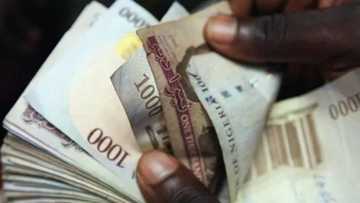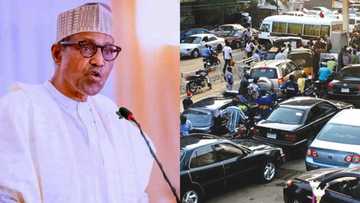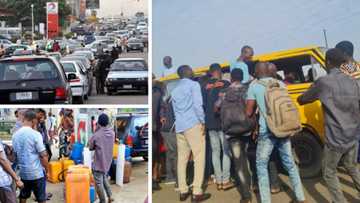Filling Stations Sell Fuel at N350 Per Litre as Lagosians Lament
- Fuel scarcity has continued to bite hard in Lagos and many other cities across Nigeria
- Motorists and other consumers of the product have continued to groan over the hike in pump price
- Black market traders of petrol have been smiling to the bank as some motorists rather patronise them than spend hours in queues
In the last two months, Nigerians have been enduring frustrating queues caused by scarcity and a hike in the pump price of petrol. Today, many filling stations in Lagos, Nigeria's commercial capital, are selling petrol for as much as N350 depending on the location and the time of the day.
The scarcity intensifies by the day, with motorists and other consumers of the product spending long hours at filling stations and wasting man hours that could have been put into more productive activities.
Earlier last week, it was reported that the Federal Government secretly increased the pump price of petrol to N185 per litre. Even though the Federal Government, through the Minister of State for Petroleum Resources, Timipre Sylva, swiftly denied the report, the price of the product still remained on the high side, selling for as much as N500 in cities like Uyo, Port Harcourt and Owerri.
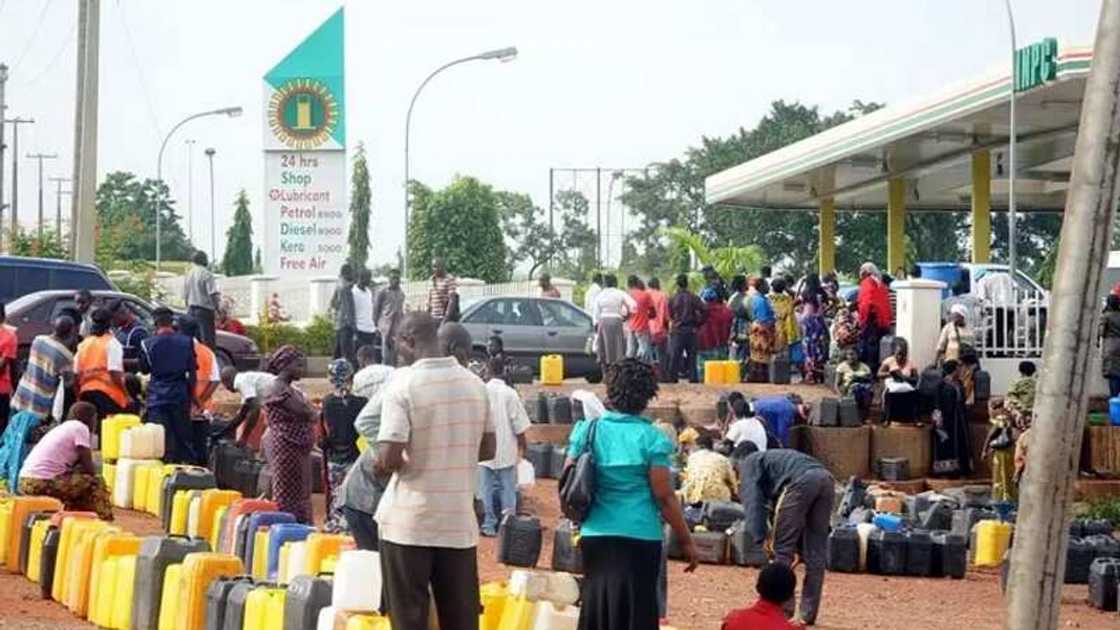
Source: UGC
PAY ATTENTION: Follow us on Instagram - get the most important news directly in your favourite app!
Fuel scarcity bites hard in Lagos
Checks by Legit.ng revealed that while the NNPC filling stations are selling at the official price of N165 per litre, other independent marketers are selling between N240-N350 per litre.
When Legit.ng probed further, it was found out that most NNPC stations hardly have the product, but the few that had fuel and were selling, were usually prone to long queues that stretch into major highways.
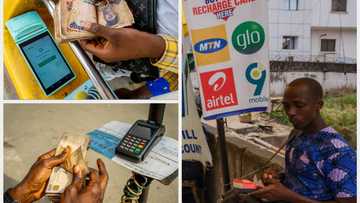
Read also
POS Operators Adjust Charges as Cash Disappears From Banks, ATMs After CBN Extends Deadline
As at press time, the NNPC filling stations in Okota, Amuwo-Odofin, and Ikeja either did not have the product or were not selling to consumers.
MRS filling station in Oshodi sold petrol to consumers at N240 per litre. ConOil in Ikeja was selling at N270 per litre and MRS filling station on Ikorodu Road was selling at N320 per litre. NIPCO filling station along the Apapa-Oshodi Expressway sold for N320 per litre.
Rain Oil in Ikorodu hardly had any queue as it sold its petrol for N350 per litre, a situation which suggested that only those who could afford the high price patronised them. The same was observed at Jezco filling station on Ago Palace way, Okota.
Further checks revealed that the private filling stations were selling at higher prices compared to major marketers. Lekan Jimoh, a Lagos-based car dealer told us the shock he received when he drove into a filling station and was told that the price for a litre was N350.
I never thought I'd see the day when I will buy fuel at N350 per litre in a filling station in Lagos. Yes, I bought a litre of fuel for N350 a few days ago at a filling station in Agege. I understand that it sometimes sold for more than that amount in some other cities in the country but never in Lagos. Because I really needed it, I had no choice but to buy a few litres.
Long queues were seen at the NNPC filling station at Fagba where petrol was sold for N165. The queue in and around the filling station extended to the major road causing traffic gridlock.
Some motorists who could not stand the long queues resorted to black marketers plying their illegal businesses close to the filling stations. Hawking their products in different sizes of jerry cans and bottles, the black market traders were seen selling petrol in the range between N300-N500, depending on the location.
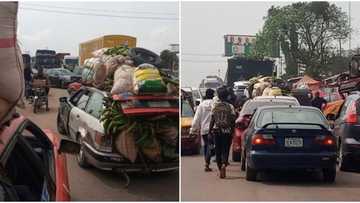
Read also
Commuters Stranded as Protesters Block Lagos-Benin Expressway Over Fuel Price Hike, Scarcity
Jide Akinloye, a motorist who spoke with Legit.ng said that was in a queue for four hours before finally getting fuel at the rate of N280 per litre at Petrocam filling station in Isheri.
Chidi Nwoko, a barber, said he had to pay an additional N200 after paying the requested value for the amount of fuel he purchased because he bought it in a jerry can.
Cause of fuel scarcity and hike in pump price in Lagos
The scarcity in Nigeria has been a recurring situation in the last decade. The Nigerian National Petroleum Company Limited, petroleum marketers and other stakeholders have given many reasons for the incessant scarcity.
Findings disclosed that some filling station owners were engaging in irregularities including diversion, hoarding and irregular pricing of the product.
Major Oil Marketers Association of Nigeria, (MOMAN), said in a statement that was released last week that the scarcity was partly caused by dollar shortages and distribution bottlenecks.
The association also attributed the scarcity to the insufficient number of trucks to deliver the product from the depot to filling stations across the country.
When Legit.ng embarked on a fact-finding mission, Musa Abdullahi, a marketer of petroleum products stated that the disparity in the exchange rate between the naira and the dollar continues to make it difficult for marketers to buy the product at regulated prices. He said:
We are no longer buying petrol at the price we were buying it a few months ago. Unfortunately, it gets more difficult to find enough dollars to buy the product, even though we now have to buy at higher prices because the exchange rate keeps favouring the dollar over the naira. If we buy higher, we have to sell higher or else we may run at a loss.
Speaking to Legit.ng on the hike in the pump price, the manager at Jezco Oil in Okota, who did not want to be named, said that the fault is partly that of the private depot owners who sell the product for an increased price.

Read also
New naira notes: Cash crunch hits the Nigerian banking system, ATMs run dry, banks ration new notes
He said;
The depot owners sell to us for about N240 per litre. And when we consider the cost of transportation and other logistics, there's no way we can sell for less than N260-N270. This is what we have been trying to explain to our customers in the last few weeks. As you can see, the cost price is already far above the official pump price set by the government.
The high price Nigerians are buying fuel has been a subject of controversy in the last decade, given that the government claims to be spending billions to subsidise the product.
Nigeria's Minister of Finance, Budget and National Planning, Zainab Ahmed had, a few weeks ago, hinted that the Federal Government will gradually withdraw the payment of fuel subsidies in 2023. Since the minister's announcement, there have been concerns from some quarters that the pump price of petrol could rise to as much as N800 per litre.
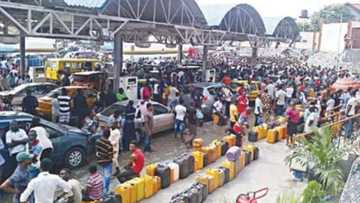
Read also
Scarcity: Why petrol could sell N800/litre, marketers give crucial information to Nigerians
Lagos directs filling stations to operate from 9am to 4pm
In an effort to contain the growing traffic in Lagos, the government of Lagos State has directed filling stations to restrict operations to the hours between 9am to 4pm, Legit.ng reports.
The directive became imperative in the face of traffic gridlocks that have overtaken major roads in the state as a result of fuel queues caused by scarcity of the product and the increased pump price.
The statement which was signed by the Lagos state commissioner for transport, Frederic Oladeinde, disclosed that filling stations will not be allowed to open until 9am and are expected to close at 4pm until the situation improves.
The Vehicle Inspection Service (VIS), the Lagos State Traffic Management Authority (LASTMA), the Transport Operations Compliance Unit (TOKU) and other law enforcement operatives have been commissioned to ensure the free flow of traffic during the course of the directive.
Source: Legit.ng


